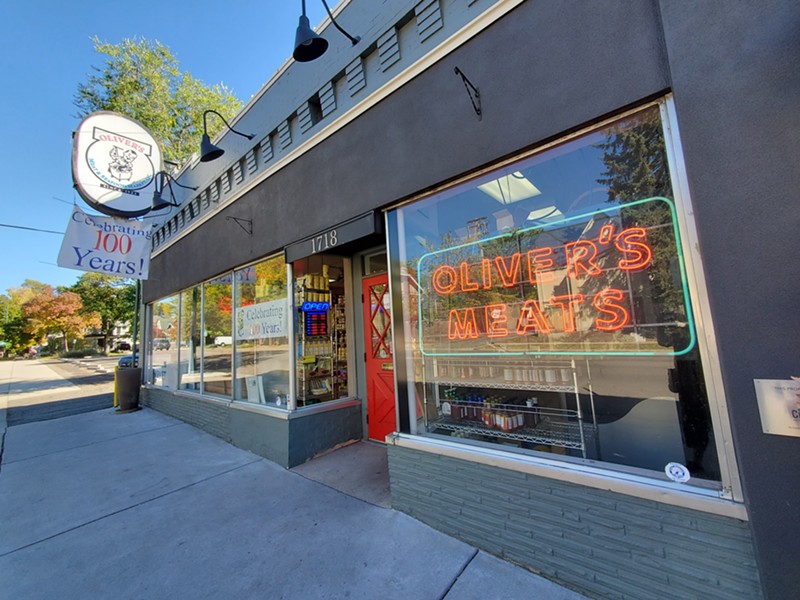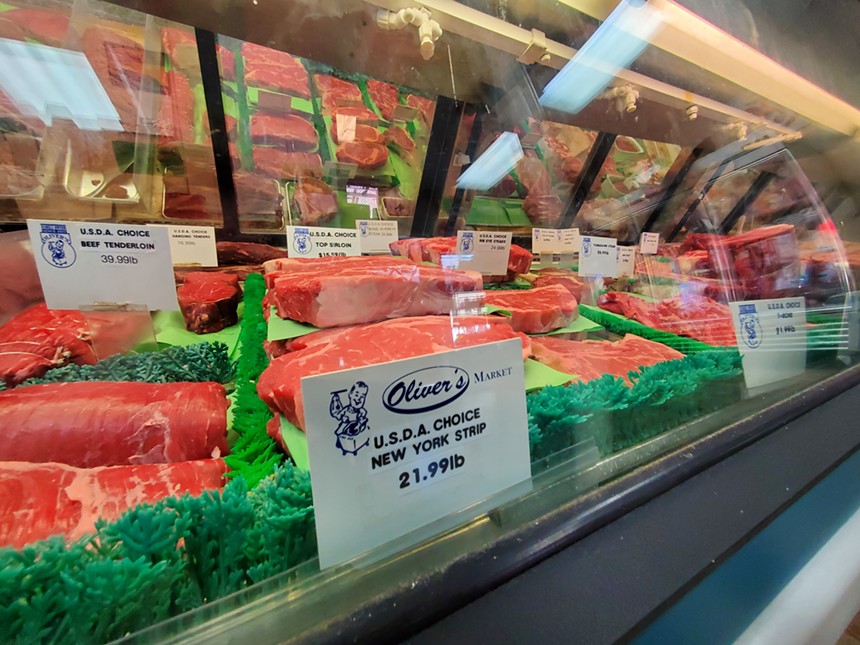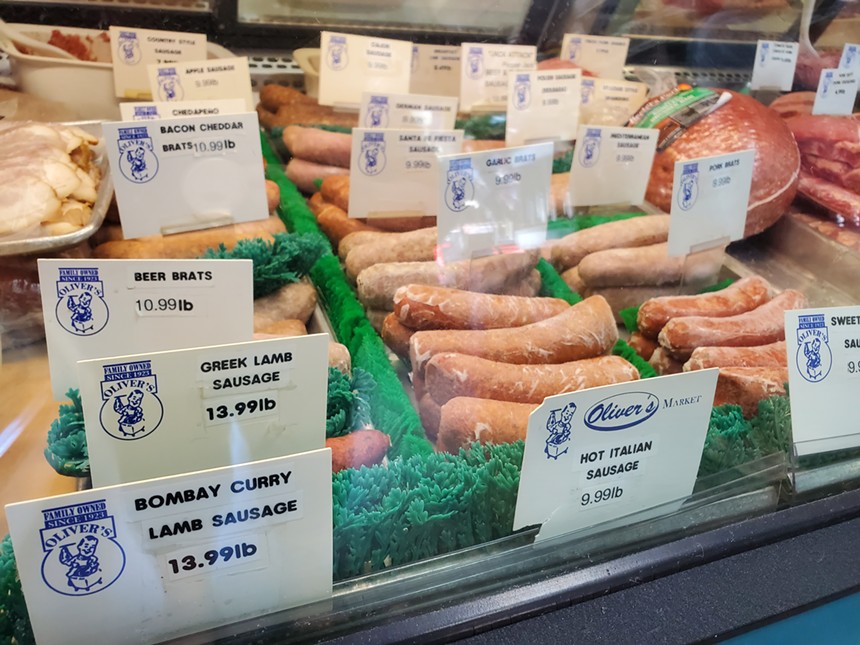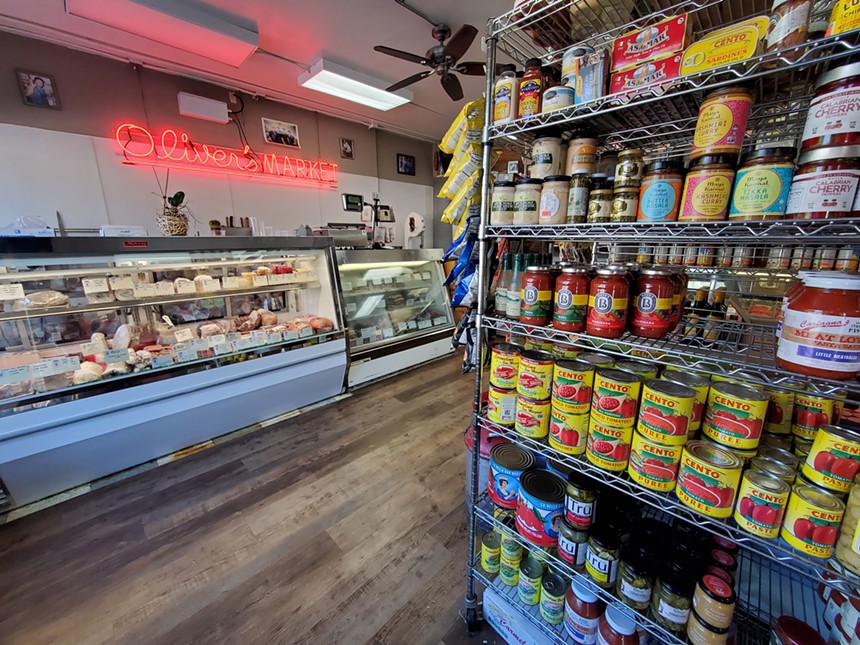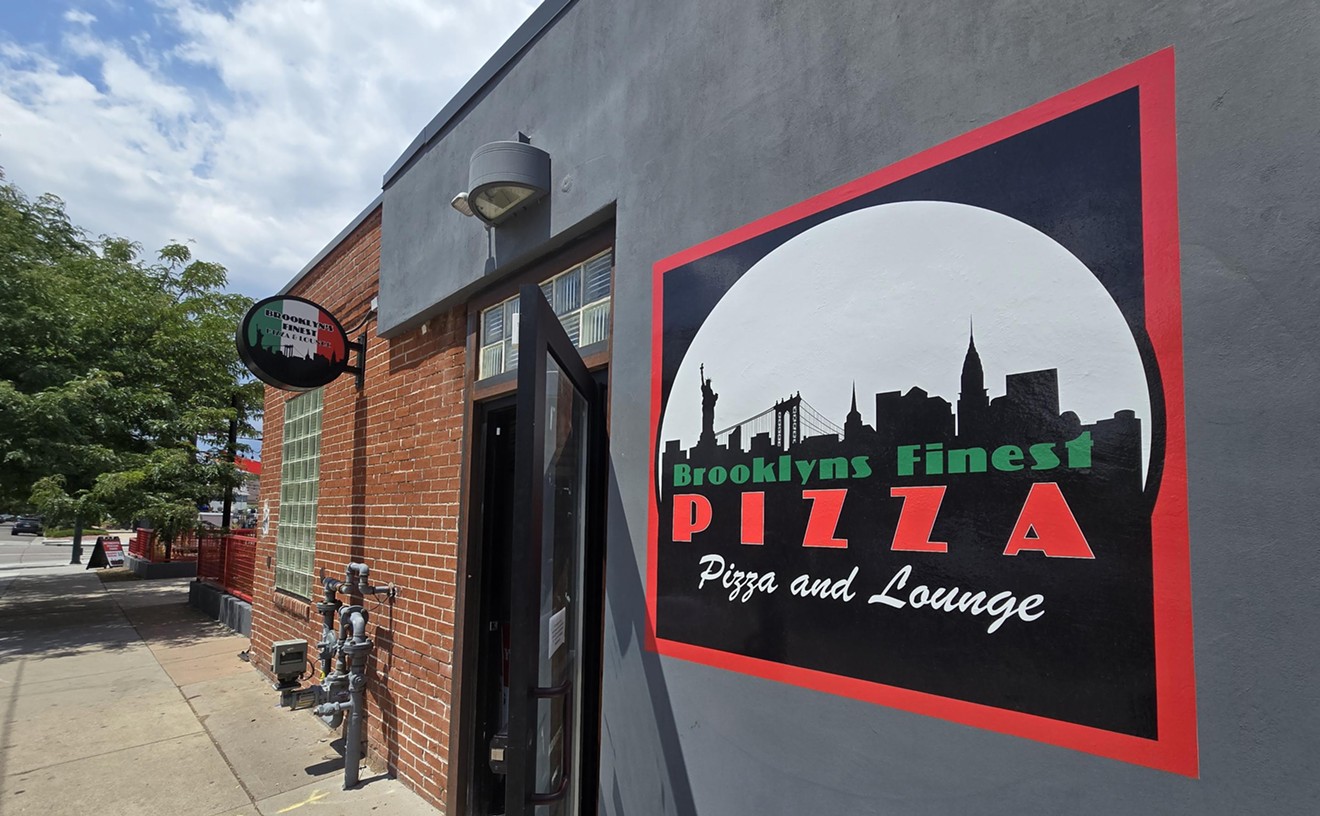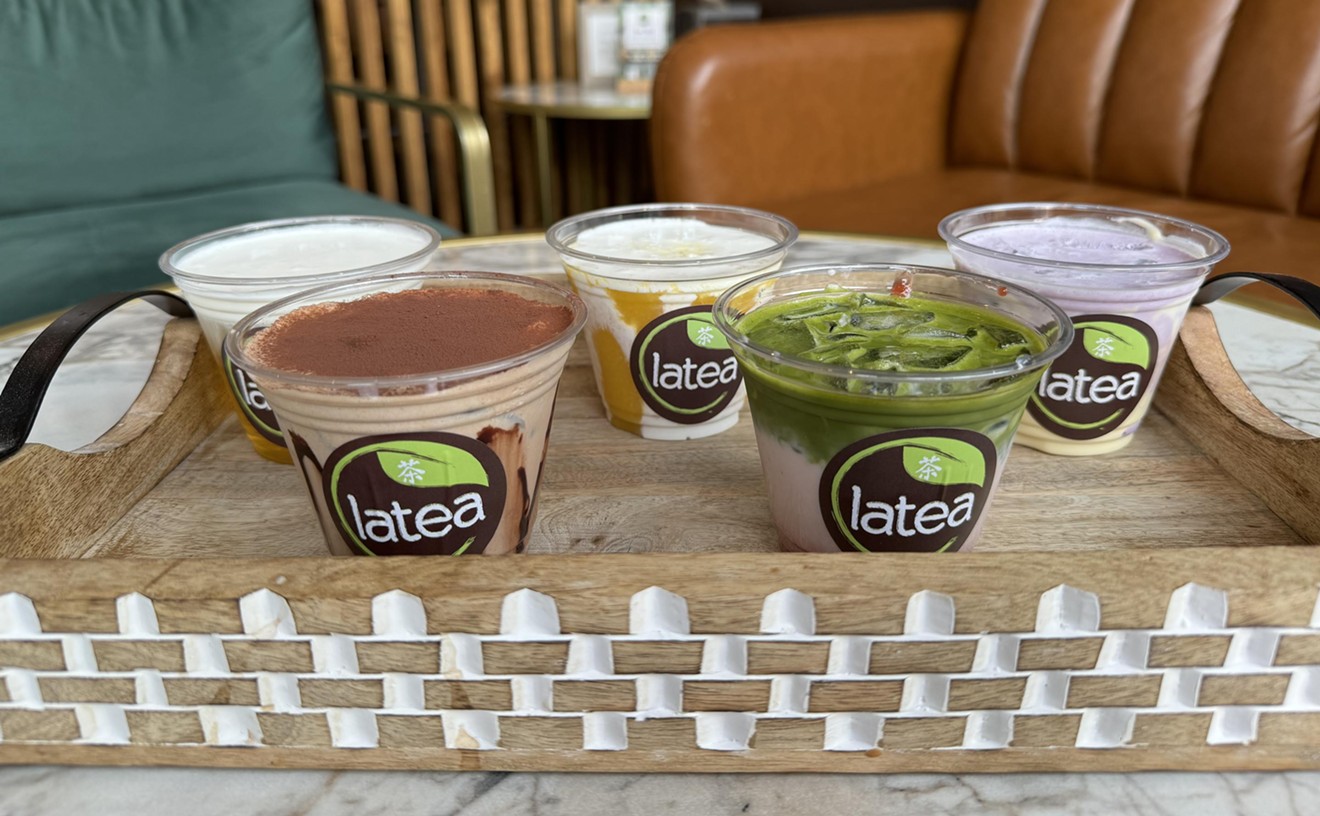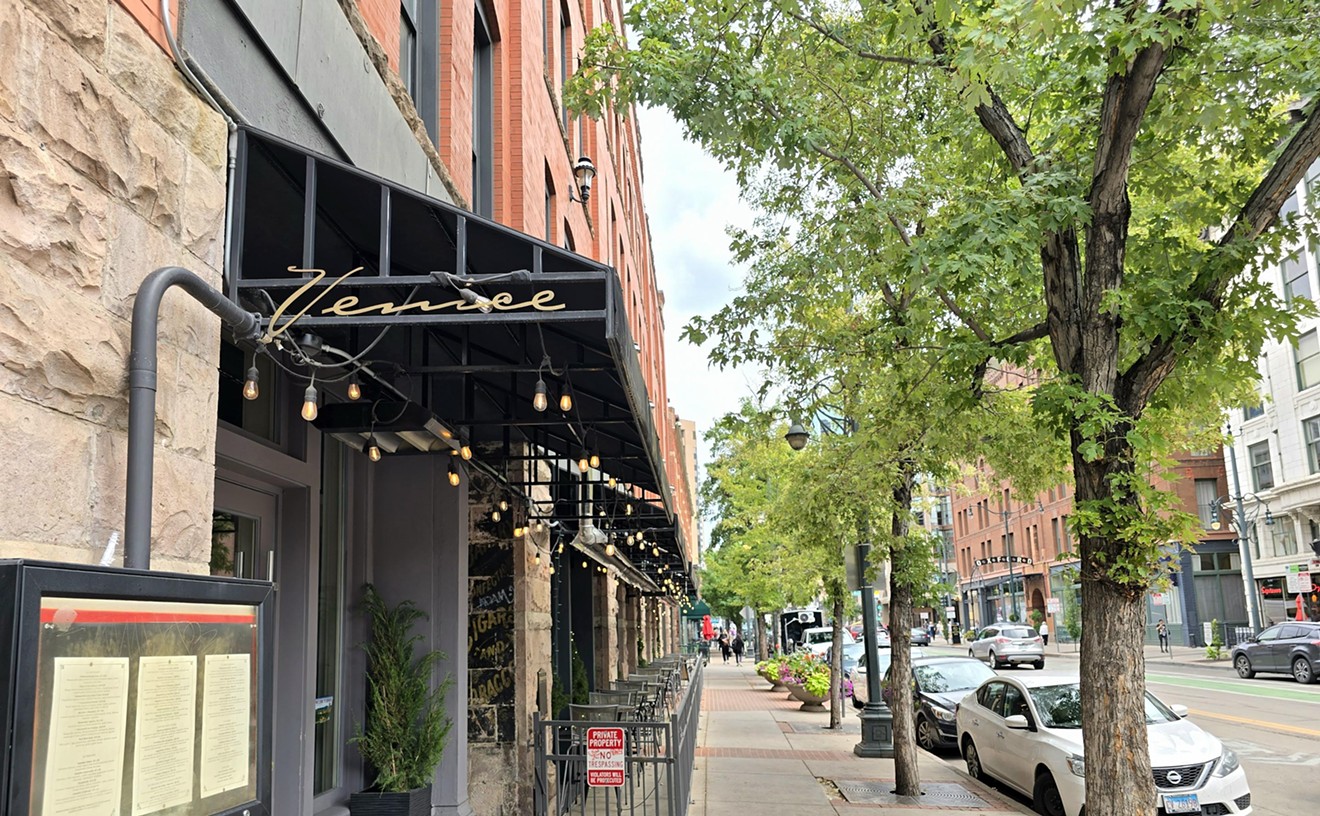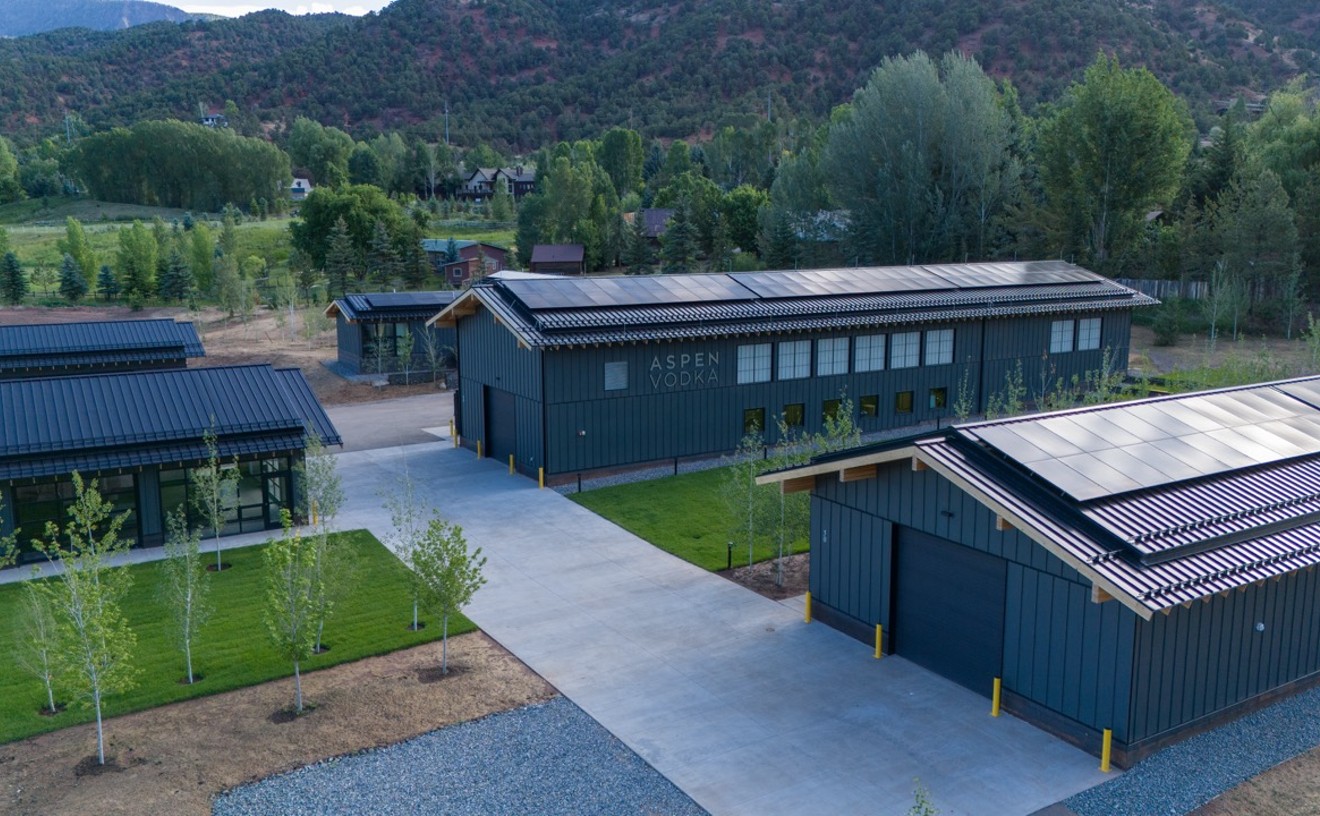Step inside the red door under a placard depicting a smiling butcher, and it’s immediately apparent that this is not the sanitized, bleach-drenched meat counter of a supermarket. First of all, Oliver’s Meats smells like meat. The shop’s dry-aged beef lends a pleasant fragrance to the place, like leather and candle wax.
Look a little further: Inside the glass counters, various steaks and chops and roasts are stacked on kelly-green paper, a stark contrast to the fat-marbled red flesh. Chicken breasts and pork cutlets are likewise splayed on the same paper, lined up like playing cards on stainless-steel trays. Those pea-colored sheets stand in for the soggy pads and shrink-wrapped Styrofoam plates used by major grocery chains.
Another difference: Few items are pre-packaged. Unlike the take-it-or-leave-it displays in the meat aisles of big-block stores, Oliver’s takes a customized approach. Clients tell the shop's meat cutters what they want and how they want it. Once trimmed, deboned, filleted or ground, each order is wrapped in white paper and bound with gum labels bearing the friendly-butcher logo. It’s the way the family-owned and -operated store has been doing business for the last hundred years — not so much a throwback as a continuum of tradition that spans four generations.
On a recent Sunday afternoon, Rich Oliver stood behind the counter with his wife, Michelle, and an assistant. The three traded quips among themselves and with customers who had stopped by to get provisions for the night’s meal. The camaraderie between the staff and patrons bears witness to a retail style that harks back to 1923, the year Rich’s great-grandfather, Ed Oliver, first sold his butcher’s wares from a storefront on Sixth Avenue and Pearl Street, when electric streetcars rumbled down the thoroughfare’s tracks and horse-drawn milk and ice wagons were not an unusual sight.
Ed moved Oliver’s Market (as it’s also known) to Sixth and Marion in 1939, passing the business on to his son, Dick, while continuing to work until he was 97. Dick managed the store for decades with his son, Barry, who carried on after Dick passed away. (Photos on the store’s white walls document the Oliver family history.) Two of Barry’s sons, Rich and Jim, have worked in the store since the 1970s, taking over the business in the late 1980s, moving the store a few blocks east to its present location on Sixth Avenue between Gilpin and Williams in 2005, and working alongside their dad until he retired. (Barry died in 2013.)
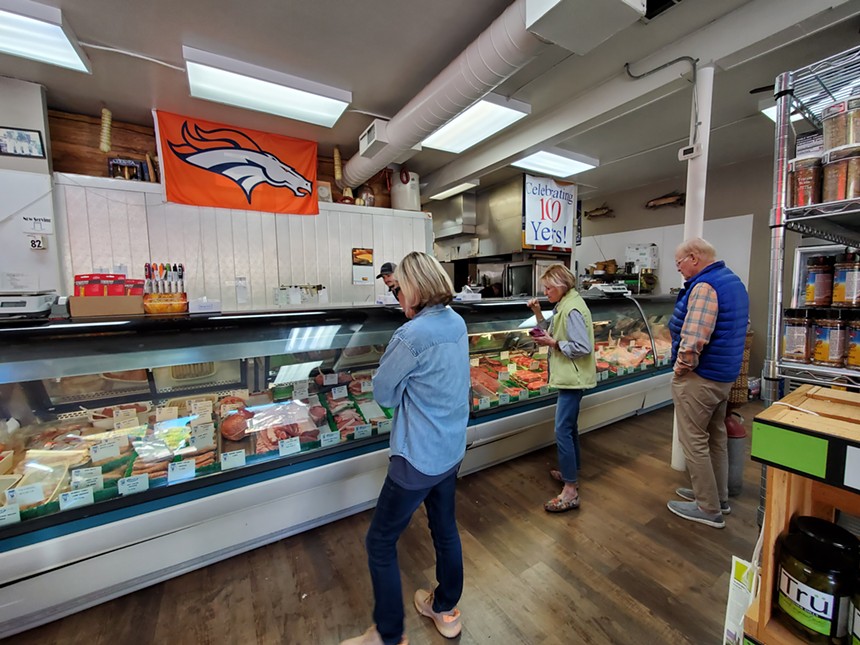
While the business has moved a few times since 1923, it's still run by the same family.
Molly Martin
But chatting up customers is not the only distinguishing factor in Oliver’s longevity. According to Jim, clients come for the quality of the goods as well as the personalized service offered by himself, his brother Rich and their three employees. Although “quality and service” sounds like a stock phrase, Jim insists that it’s a bedrock principle. “We keep our quality high by working with our long-term suppliers,” he explains, noting that most of the shop’s meat — beef, veal, lamb, pork and chicken — comes from Colorado and Nebraska producers. Fish and seafood, both fresh and frozen, are sourced from trusted suppliers on both coasts. When customers want something special — say, fresh lobster or crab — Oliver’s can get it on short notice.
Jim speaks with particular pride about Oliver’s sausage varieties — more than forty in all, from German and Italian to Cajun and Mediterranean-inspired flavors — most of them housemade from the store’s original recipes. Those offerings have filled the gap in demand for locally crafted links after the closure of other meat markets and delicatessens.
Since the early 2000s, Oliver’s has also expanded its line of dairy products to include imported hard and soft cheeses, along with a number of specialty foods like olive oils, pasta sauces, condiments and other meat-complementary goods. “To keep up with demand,” Jim says, “we’ve had to adapt to changing times." He adds that Oliver’s has always had a grocery component, including when it was associated with the now-defunct Fruit Basket at the Marion Street location. (That storefront is now a pho restaurant.)
For Denver’s family-owned small businesses, survival in changing times has never been a sure thing, particularly in the past five years. According to a study by Guidant Financial, small businesses face an array of challenges, from overhead costs (rent, worker pay) to difficulty in hiring and retaining qualified staff. The Guidant report notes that only 65 percent of small businesses in its survey are profitable. COVID shutdowns also took a toll, nationwide as well as in Denver, where the downturn in foot traffic meant numerous small-business closures, particularly in downtown areas.
But Oliver’s has soldiered on, despite the pandemic’s trials. Jim reports that his store never closed for a single day, and it did not take any federal aid via the Paycheck Protection Program. “We were super busy,” he recalls, explaining that with all the restaurant closures, “people were cooking more at home.” Long-term, that has given the shop a boost in return customers, who like the store’s attention to individual service and its Colorado-centric products.
As Denver morphs into an outsized iteration of itself, many of its longstanding businesses have succumbed to development pressures, high rents and staffing shortages. Ohle’s Delicatessen and Vollmer’s Bakery, side-by-side fixtures from the last century on East Colfax and Humboldt Street, didn’t make it to the millennium; Duffy’s Shamrock Bar and Restaurant closed in 2006 after more than fifty years on Court Place; Bonnie Brae Tavern and its neighbor across South University Boulevard, the Saucy Noodle, shuttered in 2022 after decades in the hood. Franchises — fast-food eyesores, colorless bank branches, nondescript drugstores — have in many cases filled the void, substituting cookie-cutter architecture and chain-trained employees for the funky appeal of homegrown establishments.
Bucking this dreary trend, Oliver’s continues its march into the future with a spunky resolve. While Rich and Jim's offspring have not stepped up to take over for them — so far, at least — the fourth-generation owners, who are now in their sixties, have no plans to retire anytime soon. “We’ll just keep working, doing what we do the best way we can,” Jim says. That means offering high-quality locally sourced products and a customer-first ethos. It also involves being authentic — or, as Jim puts it, “Sticking to what you know and not being something you’re not.”
With Oliver’s entering its second century, that’s as time-honored a business plan as any.
Oliver’s Meat & Seafood Market is located at 1718 East Sixth Avenue and is open from 8 a.m. to 7 p.m. Monday through Friday, 8 a.m. to 6 p.m. Saturday and 9 a.m. to 5 p.m. Sunday. For more information, visit oliversmeatmarketllc.com.

